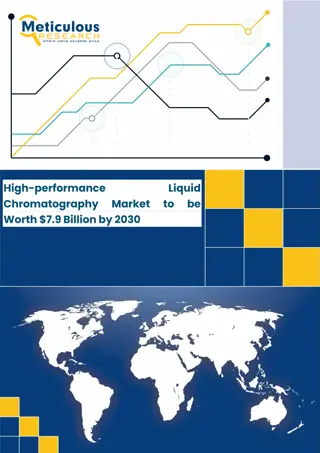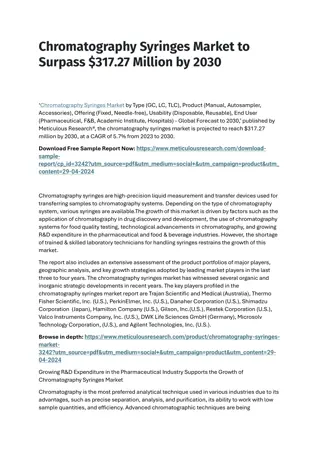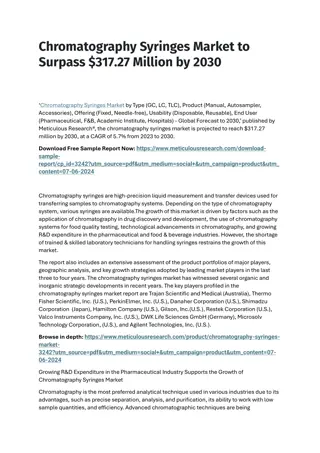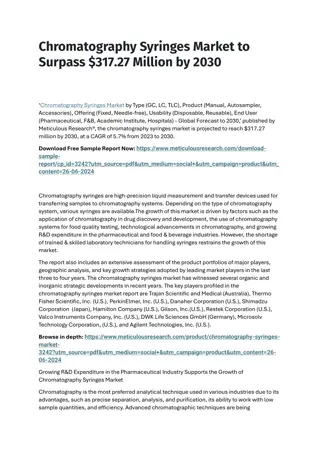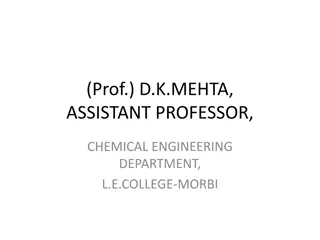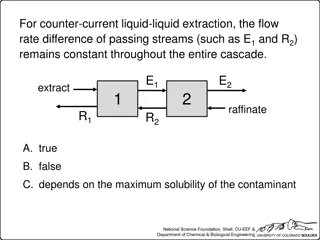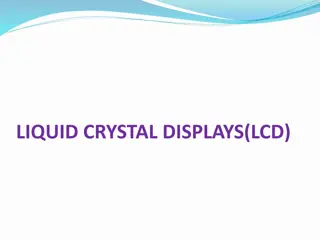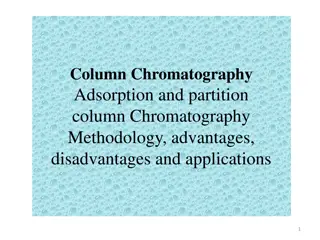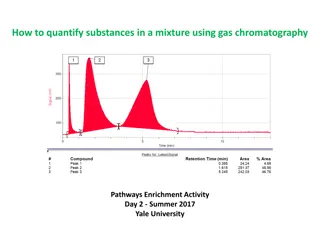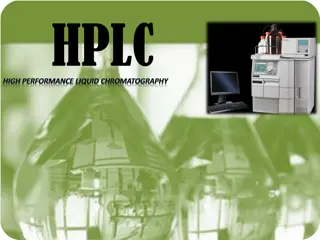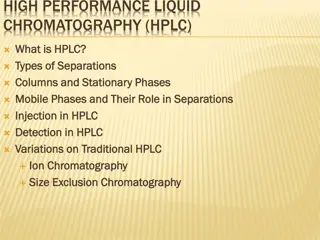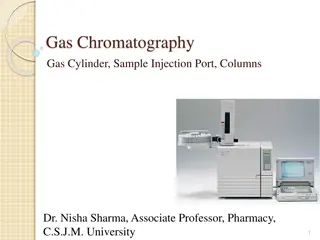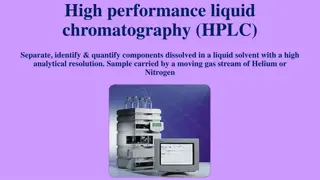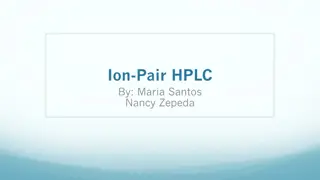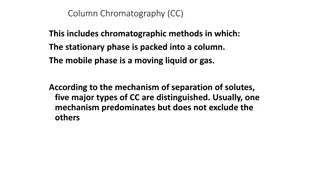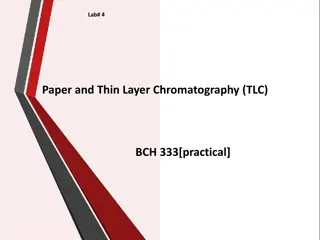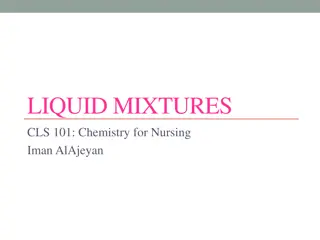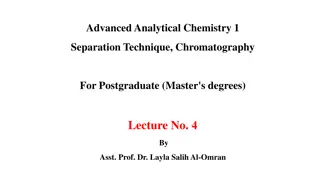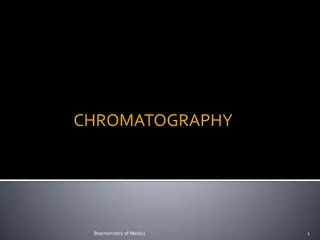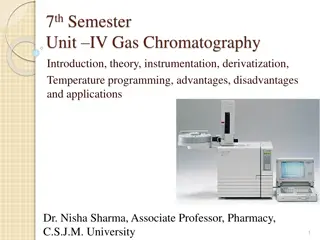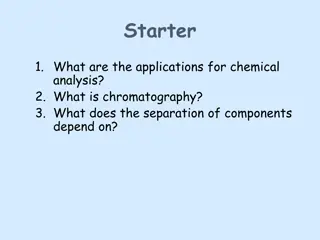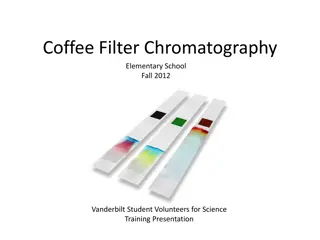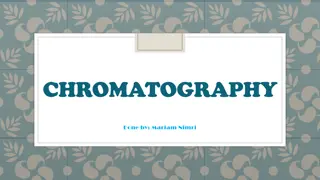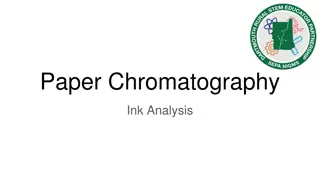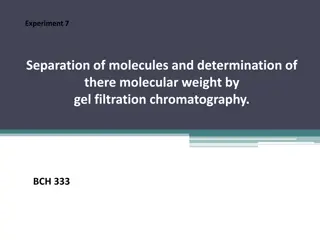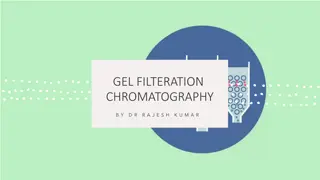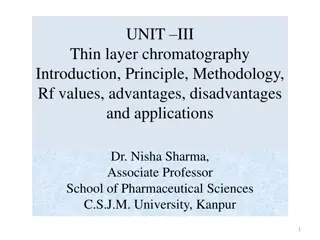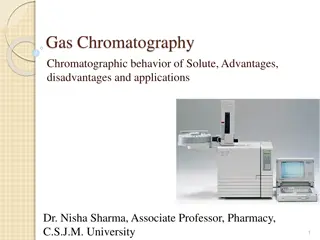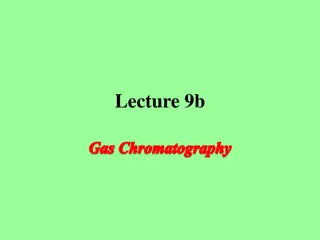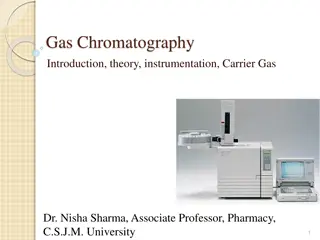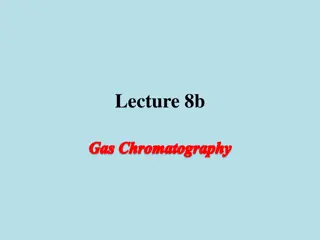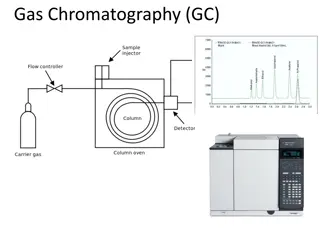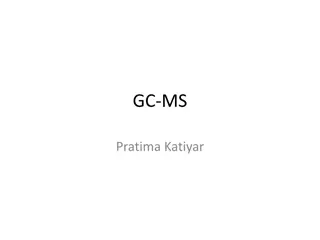mRNA Chromatography Applications: Resin Types and Purification Efficiency
This content delves into mRNA chromatography applications, focusing on the mRNA purification process using dT affinity chromatography, IEX, HIC, and RP techniques. It discusses the application of mRNA affinity resins like Monomix dT20 and Proteomix POR50-dT20, highlighting their properties, purifica
4 views • 8 slides
Chromatography Syringes Market
Chromatography Syringes are a critical component in chromatography used for ensuring high-precision measurement while transporting the sample between the storage vial and the instrument inlet. The selection of chromatography syringes depends on the injection valve type, sample properties, and inject
1 views • 3 slides
High-performance Liquid Chromatography Market to be Worth $7.9 Billion by 2030
Explore $7.9 billion High-performance Liquid Chromatography (HPLC) Market: Get exclusive insights on key market trends, segments, geographical analysis, & competitive analysis!\n
1 views • 3 slides
Chromatography Syringes Market
Chromatography Syringes are a critical component in chromatography used for ensuring high-precision measurement while transporting the sample between the storage vial and the instrument inlet. The selection of chromatography syringes depends on the injection valve type, sample properties, and inject
1 views • 3 slides
Chromatography Syringes Market
Chromatography Syringes are a critical component in chromatography used for ensuring high-precision measurement while transporting the sample between the storage vial and the instrument inlet. The selection of chromatography syringes depends on the injection valve type, sample properties, and inject
1 views • 3 slides
Chromatography Syringes Market
Chromatography Syringes are a critical component in chromatography used for ensuring high-precision measurement while transporting the sample between the storage vial and the instrument inlet. The selection of chromatography syringes depends on the injection valve type, sample properties, and inject
1 views • 3 slides
Gas-Liquid Equipment in Mass Transfer Operations
Gas-liquid operations play a crucial role in mass transfer processes by facilitating intimate contact between the two fluids for efficient interphase diffusion. Various equipment such as sparged vessels (bubble columns) and mechanically agitated vessels are used to disperse gas or liquid phases, pro
2 views • 27 slides
Liquid-Liquid Extraction Techniques and Considerations
Understanding liquid-liquid extraction processes like counter-current and co-current cascades, material balances, and system degrees of freedom. Topics include impact of flow rates, partition coefficients, solvent ratios, and purity on extraction efficiency.
0 views • 14 slides
Understanding Liquid Crystal Displays (LCDs) and Their Advantages
Liquid Crystal Displays (LCDs) offer advantages such as low power consumption, cost-effectiveness, and good contrast. These displays consist of liquid crystal cells sandwiched between glass sheets with transparent electrodes. The LCD relies on external illumination for visibility and uses nematic li
0 views • 14 slides
Overview of Performance Management Systems and Competency Mapping
Performance Management Systems (PMS) play a crucial role in ensuring organizational objectives are met through individual contributions. This entails continuous improvement at all levels - individual, team, and organizational. Managing performance is vital for survival and growth in a competitive en
3 views • 45 slides
Understanding Column Chromatography: Methodology, Advantages, Disadvantages, and Applications
Column chromatography, a type of adsorption chromatography, involves separating components based on their affinity to an adsorbent. The methodology includes passing a solvent through a column to improve separation, obtaining a chromatogram, and eluting components for analysis. The principle relies o
2 views • 24 slides
Quantifying Substances in Mixtures Using Gas Chromatography
Gas chromatography is a precise method to quantify substances in mixtures, essential for various applications like food quality analysis, blood alcohol content testing, and developing green energy technologies. By accurately determining the identity and quantity of substances, such as pesticides in
2 views • 29 slides
Understanding HPLC: A Powerful Liquid Chromatography Technique
High-performance liquid chromatography (HPLC) is a powerful tool in analysis, offering high performance and speed compared to traditional chromatography methods. It involves separating components through a stationary phase and mobile phase, utilizing adsorption principles for separation. HPLC is wid
6 views • 58 slides
An Overview of High Performance Liquid Chromatography (HPLC)
High Performance Liquid Chromatography (HPLC) is a powerful analytical technique used for separating and identifying compounds in a mixture. It involves a mobile phase and a stationary phase to achieve separation based on different physicochemical properties. The mobile phase plays a crucial role in
0 views • 20 slides
Gas Chromatography Equipment Overview: Components and Functions
Gas chromatography involves various components like gas cylinders, sample injection ports, and columns. The gas cylinder serves as a carrier gas reservoir with a pressure regulator. Sample introduction is through a column inlet/sample port injector. The GC injection syringe helps vaporize samples qu
0 views • 16 slides
Understanding High Performance Liquid Chromatography (HPLC)
High Performance Liquid Chromatography (HPLC) is a powerful analytical technique used to separate, identify, and quantify components dissolved in a liquid solvent with high resolution. It involves pumping the sample mixture through a column at high pressure, where the components interact with the st
1 views • 34 slides
Understanding Ion-Pair Chromatography (IPC): Theory and Applications
Ion-Pair Chromatography (IPC) involves adding ionic surfactants to a reversed-phase Chromatography system to affect retention and selectivity of ionic compounds. Developed by Dr. Gordon Schill, IPC is crucial for resolving hydrophilic samples and controlling selectivity in separations. The theory in
7 views • 18 slides
Understanding Column Chromatography Methods
Column Chromatography (CC) involves separating solutes based on different mechanisms within a packed column with a mobile phase. The five major types of CC are adsorption, partition, ion exchange, molecular exclusion, and affinity chromatography. Each type utilizes specific stationary and mobile pha
0 views • 11 slides
Understanding Paper and Thin Layer Chromatography (TLC) in Biochemistry
Chromatography techniques are used in laboratories to separate and identify components of mixtures. Paper chromatography is a type where a developing solution travels up a filter paper, separating compounds based on their affinity to the stationary phase. Thin Layer Chromatography (TLC) is a similar
0 views • 22 slides
Understanding Liquid Mixtures in Nursing Chemistry
Explore the world of liquid mixtures in nursing chemistry with a detailed look at solutions, suspensions, colloids, and emulsions. Learn about the properties of solutions and suspensions, the distinction between homogeneous and heterogeneous mixtures, and the various types of liquid mixtures encount
7 views • 18 slides
Understanding Ion Exchange Chromatography in Analytical Chemistry
Ion exchange chromatography is a powerful separation technique that isolates ions and charged molecules based on their affinity for a charged matrix. This method involves interactions between the analyte and matrix influenced by factors like net charge, ionic strength, and pH. Through cation exchang
2 views • 18 slides
Understanding Chromatography in Biochemistry: A Visual Guide
Explore the world of chromatography through a series of informative images covering principles, classifications, procedures, and significance of techniques like paper chromatography and thin-layer chromatography (TLC). Delve into the R value, two-dimensional chromatography, and learn about partition
2 views • 44 slides
Gas Chromatography: Introduction, Theory, Instrumentation, Derivatization
Gas chromatography is a powerful analytical technique used for separating and analyzing volatile compounds. It involves a mobile gas phase passing through a stationary phase, with components in the mixture interacting differently, resulting in separation. The technique dates back to 1905 and has evo
0 views • 12 slides
Understanding Chromatography for Chemical Analysis
Explore the applications of chemical analysis, learn about chromatography as a technique for separating components based on size and polarity, conduct paper chromatography experiments, and analyze the results to understand the principles behind this method.
0 views • 7 slides
Coffee Filter Chromatography in Elementary School Science Presentation
Discover the fascinating world of chromatography through an engaging elementary school science presentation. Learn about mixtures, separation techniques, and the process of paper chromatography using food coloring dyes. Explore how chromatography can separate different components in mixtures and wit
0 views • 10 slides
Understanding Fermi Liquid Theory in Interacting Fermion Systems
Fermi liquid theory, also known as Landau-Fermi liquid theory, is a theoretical model that describes the normal state of metals at low temperatures. Introduced by Landau and further developed by Abrikosov and Khalatnikov, this theory explains the similarities and differences between interacting ferm
0 views • 23 slides
Optimization of Liquid Cooling System Components in Data Centers
Explore considerations for selecting components such as liquid types, connection types, manifold sizes, and mate forces in data center liquid cooling systems. Recommendations cover liquid flow rates, connection locations, QC materials, and QC mate forces to enhance system efficiency and reliability.
0 views • 11 slides
Understanding Chromatography: A Practical Experiment
Chromatography is a process used to separate components of a mixture by employing a mobile phase that carries the mixture through a stationary phase. This experiment by Mariam Nimri explores the effects of different solvents on chromatography results, with a hypothesis that vinegar can impact pigmen
1 views • 10 slides
Understanding Paper Chromatography: Ink Analysis & More
Explore the fascinating world of paper chromatography, a technique used to separate and analyze different pigments in ink. Learn how water and capillary action help reveal hidden colors in black ink, and discover the science behind chromatography terminology. Try a hands-on activity to conduct a col
1 views • 8 slides
Advanced Cooling Solutions: ACS Cold Plate Focus Areas
Introduction to ACS Cold Plate focus areas led by Jessica Gullbrand from Intel. The objective is to standardize liquid-cooled solutions without hindering innovation. The ongoing focus includes approval of cold plate requirements, initiation of Open Rack V3 Blind Mate Liquid Cooling, and various work
0 views • 20 slides
Gel Filtration Chromatography: Separation and Molecular Weight Determination
Gel filtration chromatography is a method used for separating proteins based on their molecular weights. This experiment aims to teach students the principles of gel filtration chromatography and provide hands-on experience in the lab. By utilizing a stationary phase of porous beads and a mobile pha
0 views • 22 slides
Understanding Gel Filtration Chromatography: Principles and Applications
Gel filtration chromatography is a molecular size-based separation technique used to separate macromolecules of different sizes. This method, also known as gel permeation or size exclusion chromatography, utilizes a porous stationary phase where small molecules penetrate all pores and are retained,
1 views • 10 slides
Thin Layer Chromatography: Introduction, Principle, Methodology, and Applications
Thin Layer Chromatography (TLC) is a technique for separating and identifying compounds in a mixture based on adsorption. The principle involves the relative affinity of components to the stationary and mobile phases. The methodology is similar to paper chromatography, using coatings like silica gel
0 views • 21 slides
Gas Chromatography: Behavior of Solute, Advantages, Disadvantages, and Applications
Gas chromatography involves the chromatographic behavior of solutes in various ways such as retention volume, retention time, and partition coefficient. It offers advantages like good separation, short analysis time, and universal detectors for organic compounds. However, there are disadvantages suc
0 views • 15 slides
Understanding Gas Chromatography: Theory and Applications
Gas chromatography is a widely used technique in various fields such as research, industry, forensics, and environmental analysis. This method allows for the separation and quantitation of compounds based on their different polarities or physical properties. The setup consists of key parts like an i
0 views • 10 slides
Gas Chromatography: Introduction, Theory, and Instrumentation
Gas chromatography is a powerful analytical technique used to separate and analyze volatile substances. Originating in 1905, it involves the partition between a gas and a solid or liquid stationary phase. The theory revolves around retention time and the tentative identification of unknown compounds
0 views • 10 slides
Understanding Gas Chromatography: Basics, Theory, and Applications
Gas chromatography is a powerful analytical technique widely used in research, industrial quality control, forensics, and environmental analysis. This method separates compounds in a mixture based on polarity, boiling point, and interactions with the stationary phase. The setup includes components l
0 views • 10 slides
Exploring Gas Chromatography Techniques
Gas chromatography (GC) is a valuable analytical technique used in various fields like forensics, environmental analysis, and pharmaceuticals. This technology allows for the separation and analysis of complex mixtures, such as detecting alcohol levels in breath or THC in cannabis. The origins of gas
0 views • 45 slides
Understanding High Performance Liquid Chromatography (HPLC)
High Performance Liquid Chromatography (HPLC) is a powerful analytical technique used for separating compounds in a liquid mixture based on their interactions with the stationary phase and mobile phase. It involves different types of separations, columns, mobile phases, and detection methods. Isocra
0 views • 20 slides
Applications and Advantages of Gas Chromatography Mass Spectrometry (GC-MS)
Gas Chromatography Mass Spectrometry (GC-MS) is a powerful analytical technique that combines gas-liquid chromatography and mass spectrometry for substance identification. It offers superior performance with features like enhanced molecular ion, improved confidence in identification, wider sample ra
0 views • 10 slides


